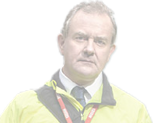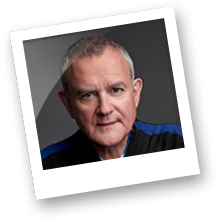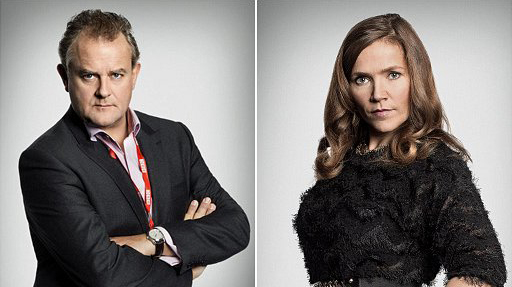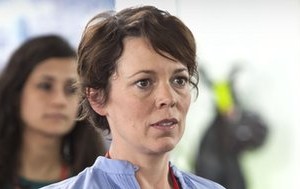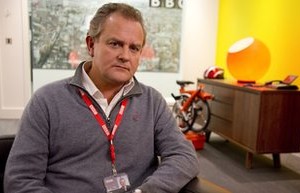Interview by Rumeana Jahangir for the BBC
It was fairly inevitable. After demonstrating their well-meaning ineptitude at the Olympic Deliverance Commission in Twenty Twelve, Ian Fletcher and Siobhan Sharpe have now joined the Beeb for W1A.
The eagerly-awaited BBC Two comedy follows them in the run-up to charter renewal. So, amid their back-to-back meetings and attempts to find a hot desk, what better than a navel-gazing Q&A with Ariel?
Ian Fletcher, Head of Values
Were you surprised at the success of London 2012, despite the problems you faced in the run-up?
Not at all. I’m a firm believer that problems are just solutions waiting to happen. Basically London 2012 was one giant solution.
How did you get your job at the BBC?
In the first instance I was head-hunted, which in my case meant I was approached informally by an ex-friend of my ex-wife who, I think, went to school with Chris Patten’s brother.
After that, there were inevitably endless forms to fill in and an exhaustive interview process that included three days away with the senior management team at a monastery in Wales. It was a silent order, which made it all the more challenging and, at the same time, genuinely intense in a way that I couldn’t articulate at the time for obvious reasons.
I was later told that were no other candidates, or indeed applicants, on either the shortlist or longlist for the post, which makes me feel uniquely privileged to have got it.
Why have you appointed Siobhan Sharpe to your new team?
I should perhaps point out that I wasn’t in fact responsible for appointing Siobhan.
I was told that she’d been recruited some time after I’d formally accepted the post – in other words, when it would have been legally very complicated to start unpicking things.
I should perhaps also point out that she isn’t strictly speaking “on my team”. Her official title is Brand BBC consultant, which means that she’s very much on her own team, which is where Siobhan undoubtedly works best. So basically it’s all good.
What happened to your previous PA Sally?
I’ve been strongly advised by Tracey Pritchard in the BBC press office against talking about personal matters in interviews, and since Sally was my personal assistant I’m afraid that rules this question out.
Please can you explain – in plain English – what your new job involves?
Funnily enough that’s almost word for word what the first, and really the only, question at my interview was.
I see my job as being here to think Big Thoughts. As Head of Values, you’re aware that you’re at the centre of something genuinely important. Essentially my job involves trying to establish where that centre is, and also exactly what it’s in the middle of.
Do you think you could improve the way the BBC is run?
I’m a firm believer that, no matter how good something is, there’s always room to make it better. There’s no such thing as a perfect organisation and, as I said at interview, the BBC is one of the world’s truly great examples of that principle.
How are you finding working at Broadcasting House?
Initially I was a bit unsettled, not to say disorientated by the open-plan hot desk environment, until I realised that it was deliberately designed to achieve that effect.
You have to say it works brilliantly.
What have been the best and worst bits of working at the BBC so far?
I’m a firm believer that there’s no such thing as the worst bits of anything. What we call worst bits are in fact just best bits with the wrong clothes on.
Have you been to other BBC offices, or outside London?
Not much I’m afraid. There’s too much to do. I did go up to Salford one morning a few weeks ago. I came back later the same evening.
Senior managers have a tendency to run up big taxi bills when other staff are cutting back. We hope you’re using your folding bike or Oyster card instead?
I’m pleased to say that I invested in a new bike the moment I found out that I’d got the job. The best thing about this one is that it’s supposed to be a lot easier to fold up than my last bike – once you know how to do it – so I’m really looking forward to that happening.
Is there anything else you would like to say?
Not at this particular juncture thank you, so that’s all good.
Siobhan Sharpe, Brand BBC consultant from PR company Perfect Curve
How did you find working on London 2012?
So here’s the thing with London 2012. The thing with London 2012 is we totally killed. Before they came to us all, they [the Games] was like running and jumping. Seriously. That’s all they had.
So we’re like no one even knows what that stuff is. We introduce Usain Bolt to Richard Branson. Suddenly the rest is history. Go figure.
How did you get your new job at the BBC?
Okay so here’s how that happened. How that happened is, the BBC totally came to me. They’re like okay, we’re up to our asses in alligators here.
I’m like, okay, you wanna upsize your footprint, then you gotta get different shoes. They’re like, we love that – you’re hired. That’s how that happened.
Did you do a lot of research before you joined?
So here’s the thing with research. The thing with research is – you’re in branding – your whole life is research.
People think you’re like drinking a smoothie or having, like, your feet or maybe your head massaged whatever – it’s just an example.
You’re not. It’s research. Everything is research. So yes, I did like a tonne of research. Get over it.
How do you think the BBC could promote itself better?
So the world is full of brands with like three letters in them. KFC. GAP. There are others.
The point is it’s a crowded market place out there.
So I’m Brand BBC consultant okay. So what that involves is, it involves giving the BBC brand a unique footprint like a gotta-have-it takeaway.
So you feel like, I need this cool thing in my life even if you have like no idea what the British Broadcasting Company (sic) is or what it does. So that’s what my job involves.
What are the best and worst bits about working at the BBC?
I so love this job. That’s the best bit.
The worst thing is what totally kills me, I still have to sign in at reception every time I come in for a meeting, cos I work for Perfect Curve so I’m not like a BBC employee.
This guy on the desk, he’s like, “You can’t come in unless you know who you’re visiting”. I’m like, duh – how do I know who I’m visiting until I get in? How do I know who’s even in there?
It’s like, that’s so wrong I don’t know where to start. So that’s the worst thing.
Have you met any famous people since joining the BBC?
Okay so here’s the thing with that. Apparently most of what goes down in Broadcasting House is like news stuff whatever, so there aren’t gonna be any famous people in that, except maybe like Michelle Obama or Piers Morgan and they’re more likely to be at ITV anyway – which is like part of the problem path forward guys. But that’s so gonna change.
W1A is written by John Morton. Made in-house by BBC Comedy, it is produced by Paul Schlesinger and executive produced by Jon Plowman.




